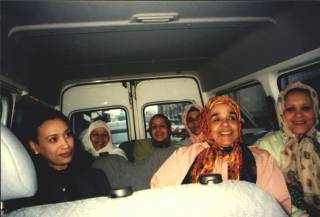My mother is from Hamada of the Dr`aa, and knows all the songs of those regions to perfection: she would take me with her to henna parties, and I really enjoyed attending them, because everybody was very kind to me, and they would give me sweets and other nice things to eat. The first time that I played in public I must h ave been about five: I beat the ta`arija without singing, otherwise I would not have been able to keep the tempo. A.B. - And how did you practice? Halima Zeiter - Well, our favorite games as children had always to do with percussion, rhythm and dance: we used cans, cardboard boxes, pieces of metal, any material which could have been beaten, and when our parents gave us a real ta`arija as a present for the Achoura (Islamic "New Year's Eve"), our joy was complete. A.B. - Did you have other jobs, besides your musical activity? Saïda Madrani - Almost all of us, when we were young girls, worked at the loom: we made blankets, carpets, belts. A.B. - Now I see where you draw certain images from; like "come on, let's go brother, come silken belt". Saïda Madrani - Yes, it could be, but since then, besides the domestic chores, the only job we've had is as popular musicians. When you begin to earn small sums of money, you no longer like the idea of going out of the house for a different job. I think I was lucky, because our job puts you in touch with the happiest moments in life: during a party everybody is happy and well dressed, and one tries to show one's best side. It is also an independent type of work, which doesn't impose obligat ions and enables you to take care of your domestic life. Generally, clients are people we know, relatives or neighbours. At the beginning of the week they come looking for you to organize the party taking place on the following Friday or Saturday, and if you are busy or have other things to do, you can always send somebody from your family, or a friend, in your place. A.B. - How was the experience of touring abroad? Khadija Haliba - Taking the aeroplane was fun, but using the escalator a little less funny, I liked going to Barbès to buy presents for my family, and also we met many of our fellow-countrymen and women abroad. We saw how they really live in that environment, in Morocco many have strange ideas of "Fransa" and Moroccans who live there, they think they all live in luxury, with beautiful houses and big cars. This is because when they come back to their villages on holiday, they go to great l engths to hide the sacrifices they endure abroad. Anyway it was nice to travel and play with our new friends, Mami (Cheb Mami), Karim (Karim Ziad), Luèn (Nguyên Lê), Bittèr (Peter Gabriel). A.B. - How did you find playing with people and instruments so different from those you are used to? Malika Rahmi - It was not that different from what we do in Marrakech. To establish an understanding with our new partners we used the usual method, that's hichara (gesture); when we are about to change mizan (rhythmic measure, lit erally "balance") I do an ouqfa ("raising movement", which consists of lifting the tara above one's head) and the stroke I give in this position is the first of the new mizan. Then we have agreed upon new signals to understand when we must stop, or give space to the other musicians, or re-enter to sustain the mizan, to do the, what does Karim call it? A.B. - Groove...but how have you experienced this change of situation? I mean, when you work in Marrakech you sit in a circle in a corner of the hall or of the ryad and begin to play and sing almost without looking at those present. You look like a baseball team on time-out. Zahra Bani - But this has to do with the norms of good manners, here in Morocco. Respect for the house, the guests, and then, when there are men, if a woman who is singing looks at them too often, she risks being mistaken for one of loose morals. A.B. - Fine, but abroad you perform in concerts-shows under the spotlights, your voices and instruments are amplified and there is usually an audience who has little to do with traditional Moroccan weddings, and is at times made up of thousands of people. Halima Zeiter - Well, even in here we wouldn't look our guests in their faces for too long. Sitting or standing, there is no major difference; the fact that during the encore we played the houari while standing initially presented a few problems, because I had to put the naqqous somewhere when I played it, then I began to hold it on my head and found that this way I could also dance. What we do, especially the most ancient things, such as the houari and hamada, is so mething which we have in our blood, they are rhythms that make our blood circulate, as well as the blood of our listeners. In this way our energy starts a mizan and this, through the microphones and the amplifiers, reaches the audience, transmitting the will to dance and make merry to them.
|

